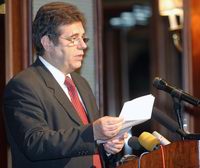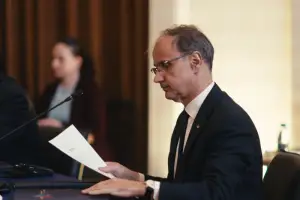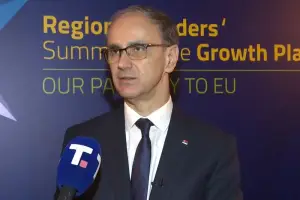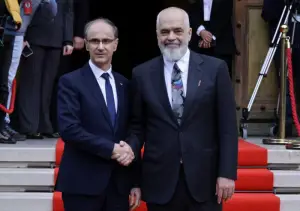Q:
A:
Serbia’s goal is to integrate into the European and world economy
Belgrade,
15 September 2004
Serbian Prime Minister Vojislav Kostunica today addressed the annual meeting in the American Chamber of Commerce (AmCham) to Serbia-Montenegro at Belgrade’s Hyatt Regency Hotel. The Prime Minister pointed to the reappearance of Serbia on the radar screen of the business and investment community and called on investors to invest in Serbia. Kostunica said that among the government’s priorities are economic modernisation, the increase of living standards and integration into the European and world economy. The Serbian government’s official website presents the transcript of the Prime Minister’s address:
“It gives me great pleasure to address the members of AmCham here in Belgrade. Relations between Serbia and the US date back over a century and during most of that time they were accompanied by commercial and business relations. I am happy to see that American investors and commercial interests are back in Serbia. I welcome you.
This is a very special opportunity for me to underline that American companies remain the leading foreign investors in Serbia. Not only is this fact illustrative of the importance of Serbian-American economic cooperation, but it also leaves a very strong imprint on the development of overall relations between the two nations.
I will share with you some of my assessments, taking the broader, political-economic view of the situation in Serbia. I am sure that in constant communication with ministers of my Cabinet you get a good picture of the specific policies that we are pursuing.
In the last four years Serbia has been labelled as “The Last Investment Frontier” by a number of business and investment commentators. That suggests a reappearance of Serbia on the radar screen of the business and investment community. Some would debate how strong the signal is, but there is no doubt that Serbia is finally emitting a signal after ten years of isolation and sanctions.
This change occurred, as you well know, on October 5, 2000 when the previous regime was overthrown through a non-violent revolution. We inherited a devastated economy: high inflation, low investment, high unemployment, low exports, high debts and miserably low wages. Very few transition governments, if any, started from such a low and weak base. The new, democratic government set out an ambitious program of economic and social change. In a relatively short period of time it delivered a lot. According to the EBRD transition Report for 2002, the then FR Yugoslavia has made the largest annual transition gains, measured by a composite index of transition indicators, outpacing the transition results in other countries. The bulk of reforms occurred in the economic system. After the initial strong surge in economic reforms a lull occurred and the pace of change was not as fast as in the past. Though regrettable from a societal point of view, this slowing down of reforms was understandable from a political-economic point of view. Namely, together with economic transition societies also pass through a political transition that is equally important. Our society was infested with high political instability. It took time to create political conditions and necessary institutions to return with more energy to economic reform. Other countries have experienced the same problem and each has sought a solution in line with its tradition, culture and political realities.
Let me now turn to a few remarks regarding the priorities of my Government. When it comes to economic matters, clearly the overriding objective is to modernise the economy, to increase the standard of living and to integrate into the European and world economy, while maintaining and enhancing the macro-economic stability that has been achieved so far. But the burden of the past is still very heavy. The manufacturing capacities in the majority of sectors are rundown, export markets have been lost to others, we experienced a major brain-drain, and domestic investment capital is at a low level.
Therefore, the said objective cannot be accomplished rapidly without direct foreign investment. We all know the benefits of direct foreign investment, weather “greenfield” or investing in existing businesses. They provide the capital which would otherwise not be available. But they also bring new technology, modern management, better use of resources, higher exports and integration into the world economy.
In the last four years Serbia has been labelled as “The Last Investment Frontier” by a number of business and investment commentators. That suggests a reappearance of Serbia on the radar screen of the business and investment community. Some would debate how strong the signal is, but there is no doubt that Serbia is finally emitting a signal after ten years of isolation and sanctions.
This change occurred, as you well know, on October 5, 2000 when the previous regime was overthrown through a non-violent revolution. We inherited a devastated economy: high inflation, low investment, high unemployment, low exports, high debts and miserably low wages. Very few transition governments, if any, started from such a low and weak base. The new, democratic government set out an ambitious program of economic and social change. In a relatively short period of time it delivered a lot. According to the EBRD transition Report for 2002, the then FR Yugoslavia has made the largest annual transition gains, measured by a composite index of transition indicators, outpacing the transition results in other countries. The bulk of reforms occurred in the economic system. After the initial strong surge in economic reforms a lull occurred and the pace of change was not as fast as in the past. Though regrettable from a societal point of view, this slowing down of reforms was understandable from a political-economic point of view. Namely, together with economic transition societies also pass through a political transition that is equally important. Our society was infested with high political instability. It took time to create political conditions and necessary institutions to return with more energy to economic reform. Other countries have experienced the same problem and each has sought a solution in line with its tradition, culture and political realities.
Let me now turn to a few remarks regarding the priorities of my Government. When it comes to economic matters, clearly the overriding objective is to modernise the economy, to increase the standard of living and to integrate into the European and world economy, while maintaining and enhancing the macro-economic stability that has been achieved so far. But the burden of the past is still very heavy. The manufacturing capacities in the majority of sectors are rundown, export markets have been lost to others, we experienced a major brain-drain, and domestic investment capital is at a low level.
Therefore, the said objective cannot be accomplished rapidly without direct foreign investment. We all know the benefits of direct foreign investment, weather “greenfield” or investing in existing businesses. They provide the capital which would otherwise not be available. But they also bring new technology, modern management, better use of resources, higher exports and integration into the world economy.
In order to count on new and additional investment, we believe that we need to dramatically improve the prevailing business and other conditions in Serbia and make them far more attractive. The foreign investor must be convinced that Serbia is rapidly becoming a country that respects law, and that the legal and institutional systems are comparable to western standards.
Our first priority, therefore, is a new Constitution that would be the linchpin of stability and security in Serbia. At the same time, the Government carefully prepared a number of systemic laws and it is very important to note that the Parliament of Serbia has already adopted more than 50 important laws. This important achievement creates a conductive environment for all investors, domestic and foreign. Finally, we adopted a number of laws and continue to work on reforming the judiciary system i.e., to make sure that the laws are indeed being implemented.
We are continuing the process of privatisation. In fact, the Government has decided to quicken the pace of privatisation in the remainder of this year. Foreign investors will probably be interested in a number of large-scale enterprises, now under restructuring, that will be placed in the privatisation process in the near future.
The two biggest economic problems that we are facing at the moment are:
First, low productivity and lack of competitiveness of the Serbian products; and
Secondly, the foreign trade and budgetary deficits.
For both of these problems foreign investments are an important part of the solution and we as a Government will continue to improve the enabling environment.
Now, I would like to underline here few important points that truly represent major incentives for your investments in Serbia. First, the profit tax is reduced to only 10% and is now the lowest in Europe. We also lifted the tax on salaries reducing the burden on employers. Secondly, I would like to remind you that Serbia is in the middle of the trade free zone as such agreements were signed with all the countries in the region, and is the only country outside the Commonwealth of Independent States that has custom union agreement with the Russian Federation. Our location on two important European corridors is making Serbia a logical choice for your regional centres. Finally, we see our educated labour force at low cost as a major advantage for companies deciding where to invest.
High on the list of priorities of this Government is the improvement of economic relations with neighbouring countries. We firmly believe that improved relations within the region will change the perception of the entire region; that cooperation, trade and capital flows within the region, will have three equally important positive effects:
First, all the benefits and gains that trade and economic cooperation brings;
Second, non-economic relations will improve, and the sense of stability and security in the region will increase;
Third, foreign investors will have an opportunity to look at us from a different and more favourable perspective.
Looking at the region of South East Europe we can see that economic cooperation is replacing confrontation. Bridges are being built where deep divides were created in the past. This process has started. Soon all of us can hope to benefit from the newly established South East Europe Free Trade Area. The reduction of customs in trade between our countries will benefit the producers and consumers within this trade area. But equally important is the fact that now we will also be perceived as a joint market of over 50 million people, rather then a bunch of small, mutually partitioned markets. Finally, of significance is also the fact that the regional integration is happening with a view of our common, European perspective.
Let me close my remarks by stating again that Serbia seeks economic modernisation, functioning democratic structures and institutions, the respect for the rule of law, and full economic integration into the world economy.”
Our first priority, therefore, is a new Constitution that would be the linchpin of stability and security in Serbia. At the same time, the Government carefully prepared a number of systemic laws and it is very important to note that the Parliament of Serbia has already adopted more than 50 important laws. This important achievement creates a conductive environment for all investors, domestic and foreign. Finally, we adopted a number of laws and continue to work on reforming the judiciary system i.e., to make sure that the laws are indeed being implemented.
We are continuing the process of privatisation. In fact, the Government has decided to quicken the pace of privatisation in the remainder of this year. Foreign investors will probably be interested in a number of large-scale enterprises, now under restructuring, that will be placed in the privatisation process in the near future.
The two biggest economic problems that we are facing at the moment are:
First, low productivity and lack of competitiveness of the Serbian products; and
Secondly, the foreign trade and budgetary deficits.
For both of these problems foreign investments are an important part of the solution and we as a Government will continue to improve the enabling environment.
Now, I would like to underline here few important points that truly represent major incentives for your investments in Serbia. First, the profit tax is reduced to only 10% and is now the lowest in Europe. We also lifted the tax on salaries reducing the burden on employers. Secondly, I would like to remind you that Serbia is in the middle of the trade free zone as such agreements were signed with all the countries in the region, and is the only country outside the Commonwealth of Independent States that has custom union agreement with the Russian Federation. Our location on two important European corridors is making Serbia a logical choice for your regional centres. Finally, we see our educated labour force at low cost as a major advantage for companies deciding where to invest.
High on the list of priorities of this Government is the improvement of economic relations with neighbouring countries. We firmly believe that improved relations within the region will change the perception of the entire region; that cooperation, trade and capital flows within the region, will have three equally important positive effects:
First, all the benefits and gains that trade and economic cooperation brings;
Second, non-economic relations will improve, and the sense of stability and security in the region will increase;
Third, foreign investors will have an opportunity to look at us from a different and more favourable perspective.
Looking at the region of South East Europe we can see that economic cooperation is replacing confrontation. Bridges are being built where deep divides were created in the past. This process has started. Soon all of us can hope to benefit from the newly established South East Europe Free Trade Area. The reduction of customs in trade between our countries will benefit the producers and consumers within this trade area. But equally important is the fact that now we will also be perceived as a joint market of over 50 million people, rather then a bunch of small, mutually partitioned markets. Finally, of significance is also the fact that the regional integration is happening with a view of our common, European perspective.
Let me close my remarks by stating again that Serbia seeks economic modernisation, functioning democratic structures and institutions, the respect for the rule of law, and full economic integration into the world economy.”













